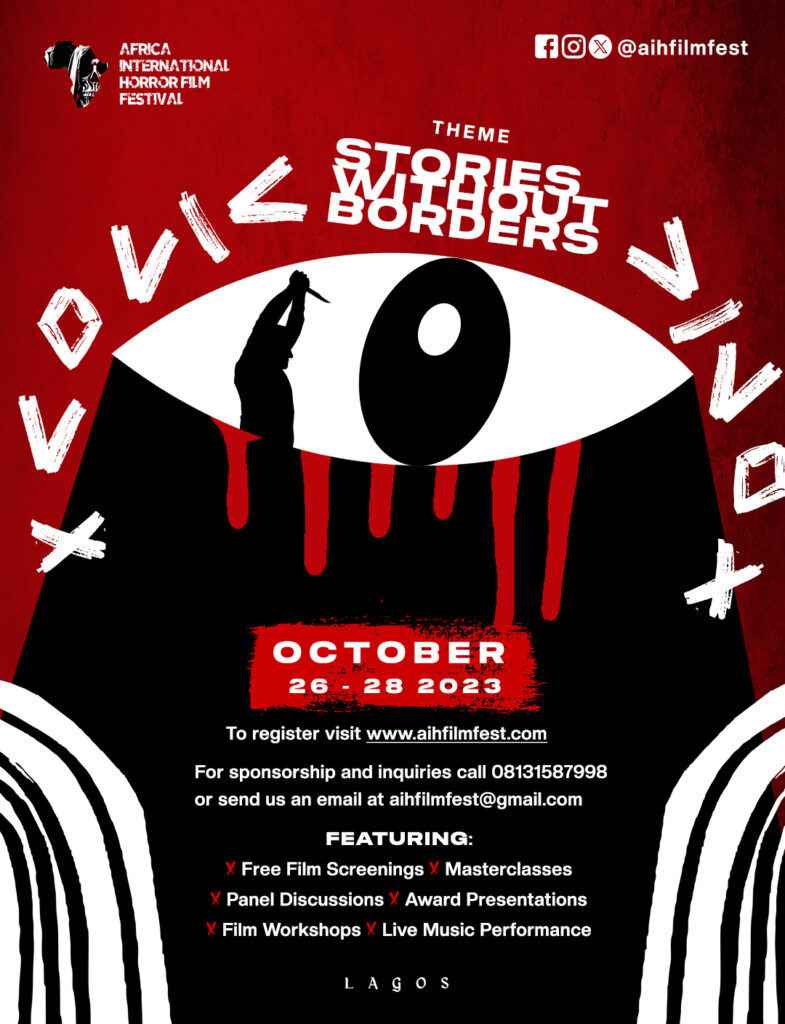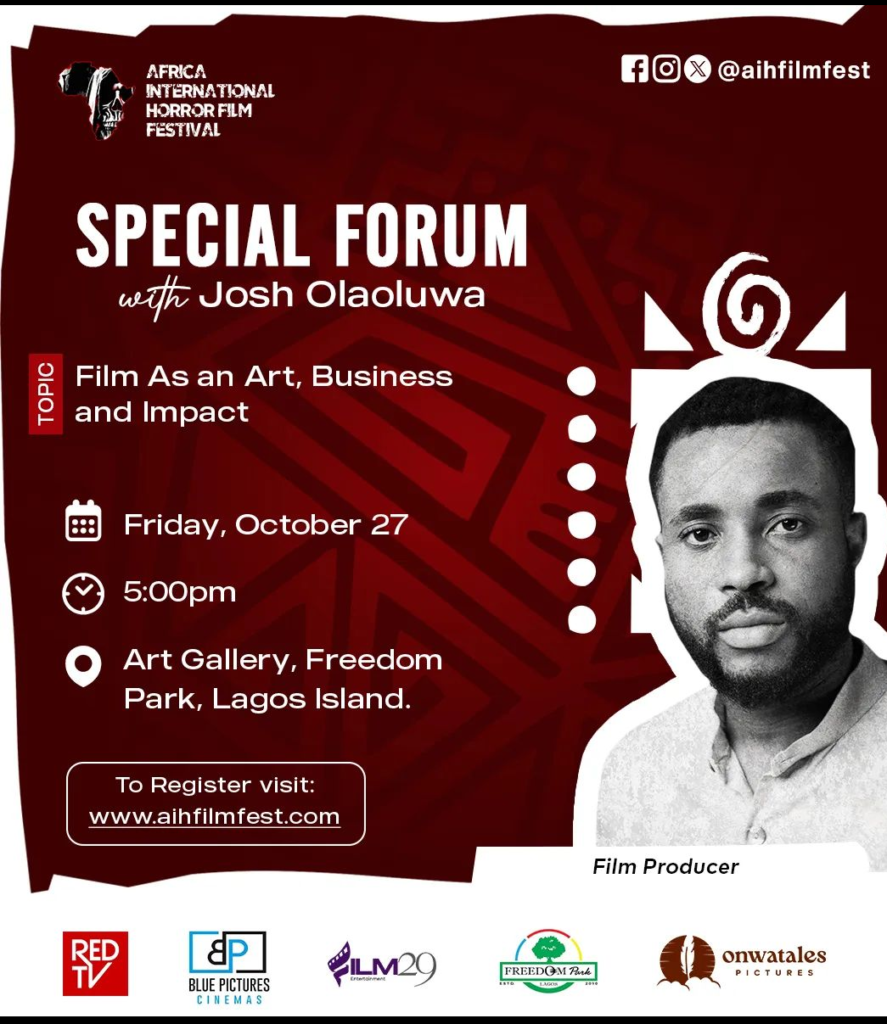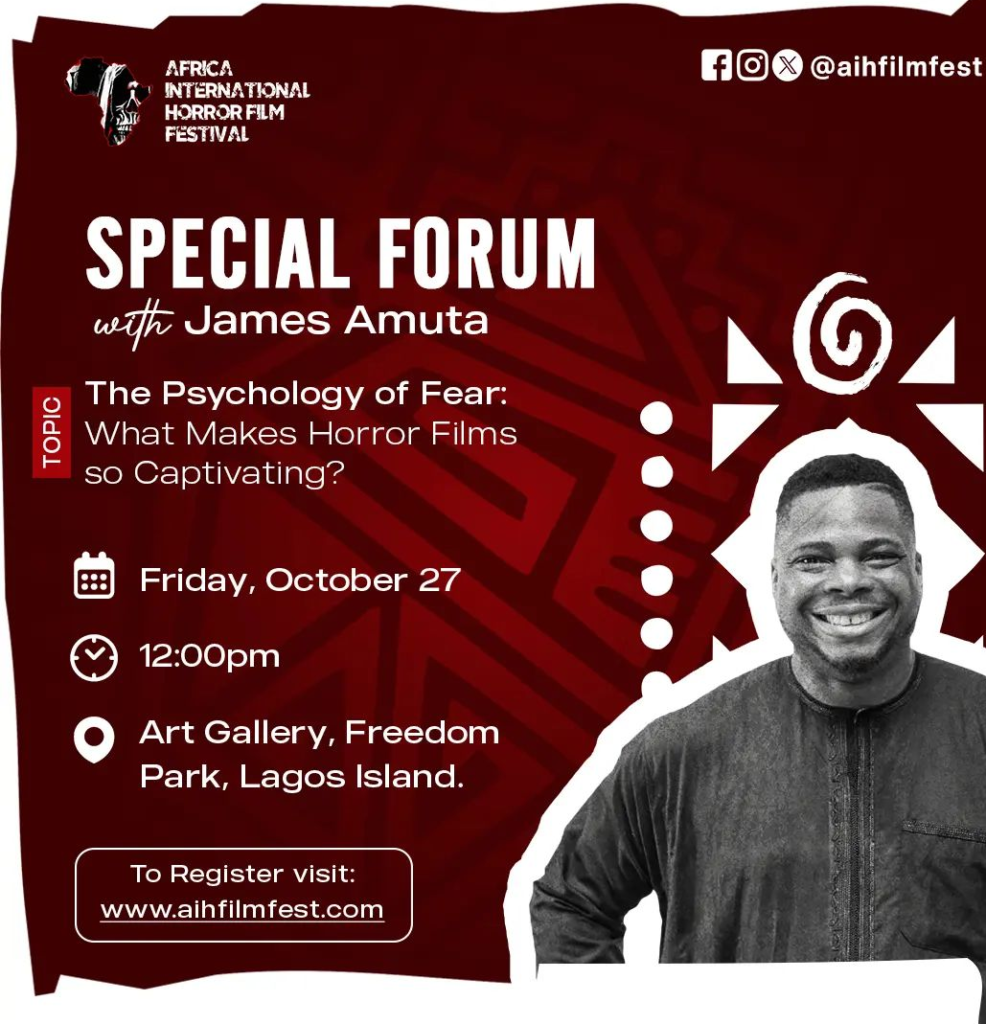“I believe horror films should go beyond scaring and entertaining the audience. It should also be used to address social issues”
By Helena Olori
The Africa International Horror Film Festival (AIHFF) is here again for its 3rd edition, and as with film festivals, the excitement is shooting through the roof, especially for lovers of the genre.
Typically, Nigerians – and perhaps Africans in general – treat horror movies like a surprise visit from a distant relative from the village: with caution and with a hint of scepticism. The reason is not far-fetched; from Nollywood classics of the 90s, such as Karishika, Last Burial, Blood Money, and Nneka the Pretty Serpent, to contemporary productions like Kunle Afolayan’s Figurine (2009), and Juju Stories (2021) by the Surreal16, Nigerian horror films have served as cautionary tales that subconsciously influence our cinema preferences. It is no surprise that the genre remains relatively unexplored in the film industry.
Fueled by her love for spooky and eerie tales, and a paucity of platforms in Africa to amplify the genre, Nigerian lawyer-cum-filmmaker, Nneoha Ann Aligwe, founded the Africa International Horror Film Festival (AIHFF) as a platform dedicated to reviving the African horror cinema industry by showcasing boundary-pushing narratives from African filmmakers. The festival, a first of its kind in West Africa, gives credence to the diversity of African cinema and its audience.
The festival begins today, Thursday 26th October, and until Saturday 28th of October 2023, at Freedom Park, Lagos and Blue Pictures Cinema, City Mall, Lagos. This year’s event is themed, “Stories Without Borders”, and will feature masterclasses, workshops, and panels on interesting topics such as, “Horror and Social Commentary: Telling Stories that Matter”, “Indie Filmmaking and their Challenges with Accessing Funds,” “Film Distribution and Marketing Strategies in Africa”, and lots more.
In the whirlwind of activities leading up to the festival, Aligwe, who is also the curator of the AIHFF, shares with Afrocritik, the vision, expectations, and potential of the festival to catapult African films to the global stage.
What inspired you to start the Africa International Horror Film Festival? Have you always been a lover of the genre?
Yes! Horror has always been one of my favourite genres. However, the genre does not really thrive in our industry, even though there are people like us who do well in telling these kinds of stories. I also thought about how horror is interwoven in our storytelling as Africans, yet we hardly tell these stories. So, I thought about setting up a platform that would help amplify the genre. While doing my research on horror festivals in Africa, I realised that we have only one such – the South Africa Horror Fest. It was really surprising. I spoke with some friends about the idea of having a horror film festival and they bought into it immediately. That is how the festival started. Currently, it is the first and only horror film festival in West Africa.
But before we delve into this, let’s get to know Nneoha Ann Aligwe.
I love to introduce myself first as a storyteller. I am also a lawyer, although I do not actively practice. I switched to filmmaking in 2019 after my Youth Service (National Youth Service Corps). So far, I have been majorly driven by my passion for the craft, and I have sought ways to improve my skills as a storyteller. I am an alumnus of the Del-York Creative Academy and EbonyLife Creative Academy where I studied Film Editing and Directing respectively. I am also an alumnus of Talents Durban 2021. Presently, I work as a screenwriter, film director, and curator of the Africa International Horror Film Festival.

The general perception of African horror films is that of superstition, compared to non-African films of the genre. Why is that so?
As Africans, we grew up hearing warnings like, “Don’t whistle in the night, you might summon the spirits”. “Don’t go to that auntie’s house, she’s a witch”, and “Don’t allow a baby to look into a mirror at midnight”. We were told that if one heard the cry of a baby at night, that was a bush baby, and if we went out, we would die. Or, that if we picked money by the road, we would turn to a yam. Several other stories like that. Our parents told us these stories to keep us in, to keep our night outing habits and other rendezvous in check. As much as these were cautionary tales, they became part of us with time. As adults now, we know these things never happened, but subconsciously, we cannot shake them off. This is why a lot of African horror films are based on superstitions. It is what we can relate to. Horror stories of zombies and such gore do not scare Africans as much as ghost stories, hauntings, witchcraft, and even demonic possessions. Overall, I think African horror is majorly driven by our folktales, culture, and tradition. However, it is still important that the stories are internationally relevant and commercially viable. The goal is to find a balance between our cultural narratives and global issues.
What do you think is required to draw attention to the genre? Are there any evolving trends or preferences among viewers?
I think African filmmakers should actively explore the horror genre and not stay limited to mainstream genres like comedy and rom-com. They should draw inspiration from our cultures, traditions, myths, and even superstitions to tell relatable horror stories. For example, Madam Koi-Koi was a popular myth in secondary schools, and there have been a lot of films made around it. Last year a feature-length film, Koi-Koi: The Myth, directed by Adekunle Lawal (Black Bishop) won the Audience Choice, Best Makeup and SFX, and Best Actress awards at the festival. It was our opening film and it was highly received by the audience because of how authentic and relatable the story was. We will never know how hungry the audience is for a variety of genres until we give them options. Also, given that society is evolving, I think filmmakers can address contemporary and trending topics like kidnappings and human organ trafficking. These are our present-day fears and they should be adequately portrayed in our horror films.
Considering the diversity of African cultures influencing the narratives, are you looking to collaborate with other film festivals or organisations to bolster the horror film community in Africa?
Yes, we are very open to collaborating with other film festivals and organisations. Nothing thrills us more than communities reaching out to us for possible partnerships. Last year, we partnered with Movie in the Park Experience for their Halloween edition where Koi-Koi: The Myth was screened. The feedback showed that the audience loved the film.

(Read also: Funding and Collaboration in Nollywood: What Could The Black Book Tech Investors Mean for Filmmakers in Nigeria?)
The AIHFF is in its third year, how would you describe the progress made so far, putting into perspective the audience response to the festival in previous editions?
I would say that the progress has been inspiring to watch. Our first year had some people questioning the relevance of having a horror film festival in the country since the genre is not so popular. Most of them were intrigued and curious about the festival. A lot of horror fans thought it was a wonderful initiative because it is a way to diversify the genres in our industry. They cannot wait to partake in our third edition. We also received a good number of submissions from African filmmakers, plus huge support from REDTV, under the United Bank of Africa (UBA). I am truly excited about the growth so far. It shows we are on the right track.
What should participants expect – the theme, date, and special events? Are there any spectacular films or talents we should be looking forward to seeing?
The masterclasses will run for two days and participants will be awarded a certificate of participation. We also look forward to screening spectacular films like, Pinky Pinky, Yahoo+, Gbese, and several more from talented African filmmakers. We also partnered with a production company, OnwaTales Pictures, to run a one-minute horror challenge, where filmmakers are to make a one-minute horror film exploring any social issue of their choice. The selected finalists will have their films screened at the festival and there is a one hundred thousand cash prize to be awarded. There will also be live music performances to ensure that our guests have an enjoyable experience at the festival.


What are your hopes and aspirations for the future of the African International Horror Film Festival, and how do you see it evolving in the coming years?
Our hopes and aspirations for the future are ambitious and promising. We want the event to be one of the most popular and respected film festivals in Africa. This recognition will not only showcase African talent but also attract filmmakers and audiences from around the world. We also plan to partner with relevant international and local organisations and bodies to introduce film labs and mentorship programs as a way of refining the skills of young filmmakers. The festival was created with young filmmakers in mind, so we plan to offer funding opportunities in the coming years, to enable them to bring their projects to life. Overall, I see the Africa International Horror Film Festival evolving into a dynamic and influential force in African cinema.
Could you share one or two memorable moments from the past editions of the festival that have left a lasting impact on you?
My most memorable moments have been when filmmakers come to me after the closing ceremony to tell me how happy they were that there is finally a horror film festival where they can submit their films. Some of the facilitators and panellists from previous editions are also happy to be involved in the festival. It is so much hard work putting together a genre festival like this, and receiving positive feedback from people somehow fuels you to keep going.
(Read also: Beyond the Visual Aesthetics, Film Locations are a Tool for Storytelling in Nollywood)
As with every other genre, horror films have the potential to propel African cinema to the global stage. What advice would you give to African filmmakers interested in the horror genre in terms of storytelling and navigating the industry?
The simple advice I will give is: Go back to your roots. Study your culture and traditions. You will surely find stories to tell. Some examples include our burial rites, masquerades, and even those cautionary tales we grew up listening to. We can explore these in our horror stories. I also believe that horror films should go beyond scaring and entertaining the audience. It should also be used to address social issues. This fusion will elevate the international relevance of your films.
Finally, you recently graduated from film school as a director. Are you looking at making your own horror films soon?
Yes! Yes! I am currently working on my first feature titled, Prey at Night, a story that addresses the psychological aftermath of rape. I am still writing the script and will hopefully secure the necessary funds to make the film. Also, I am currently in the pre-production stage of my next short film titled, Room 666. The principal photography would be completed before the end of the year.
Helena Olori is a talented multimedia journalist, she enjoys staying abreast with the latest happenings in the film industry and what makes the movie business tick. Connect with her on Instagram @heleena_olori or helena.olori@afrocritik.com




